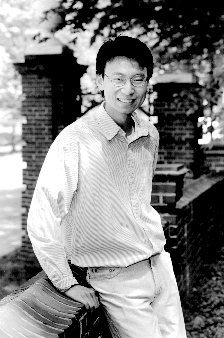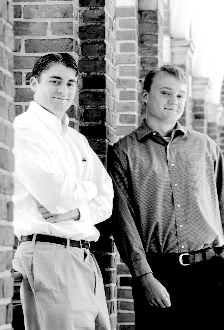|
|
Honors BoundAs the Class of 1998 prepares to leave Homewood, 'The Gazette' visits with some of its outstanding members
|

A journey to wisdom
One might think that winning a rare Fulbright Scholarship in Great Britain would be the highlight of a young life. But after a youth marked by upheaval and the isolation of being a stranger in a foreign country, graduating senior Tang Ho views the grant more as the next step in what has become, for him, a more important journey toward wisdom and self-expression.

It was a long journey from Taiwan via Texas that brought biomedical engineering major Tang Ho to Hopkins. Now his Fulbright will take him to study in Great Britain. "I think you gain wisdom," he says, "when you open yourself up to new ideas, new experiences and new people." |
Tang spent his first 13 years being raised in Taiwan by his teacher-father. Though his father was demanding and strict, the two were close, he says, and he knew he was the center of his father's world. But his father's health had never been good, and after he was injured in a fall, he believed he could no longer care for his son.
So Tang was sent from the lush greenscapes of his homeland to Abeline, Texas, to live with a mother he didn't know. Though they hadn't seen each other since she had left for America when he was 2, mother and son overcame the awkwardness of years of separation and grew close. However, Tang was not as quickly accepted by his mother's family, who had never condoned his parents' marriage and with whom they now lived.
Tang had always been shy. Now, lonely and homesick, he struggled to learn English and to make sense of his new life. The pain of separation from his father was made more confusing because, after giving Tang a childhood full of vigilant attention, his father refused to contact him in any way.
In high school, friendly classmates and caring teachers spent time after hours with Tang to get him up to speed. He worked hard at school and in the family's Chinese restaurant. By senior year, he was named class valedictorian and was accepted into Johns Hopkins. Still, he never shook the feeling of being different from everyone else, he says, and sensing he didn't really belong anywhere.
That changed at Hopkins. Here he met other students who had had similar immigrant experiences, and, probably more important, he worked hard to overcome his shyness and to help other people who were also feeling lost or alone.
It wouldn't be until a 3 a.m. phone call during his junior year that Tang would once again receive word of his father: He was in a hospital, dying, he was told. Tang packed his bags and took the first flight to Taiwan, but by the time he got there, his father had died.
"Now I'll never really understand," says Tang. "But I think he wouldn't have any contact with me all those years because he wanted me to get on with my new life and not look back."
Now, as Tang looks back on his years at Hopkins, he says he is less proud of being a biomedical engineering major with a 4.0 average than he is of being president of the student social events programming committee, making sure there was something happening on campus for everyone. Or getting up the nerve freshman year to join the speech team, and overcoming his fear of public speaking.
Or for putting together a group of students to visit patients at a VA nursing home once a week. (It was the stories of the war in Europe told by old, dying soldiers, he says, that gave him a bit of the wanderlust he has now.)
"I'll always be shy, but I've learned how to put myself out there and not wait for people to come to me," he says. "I think that you can go to college and study hard and get a great education. But education and wisdom aren't always the same thing, and I think you gain wisdom when you open yourself up to new ideas, new experiences and new people."
His Fulbright will send Tang to either the University of London or the University of Edinburgh to study the biotech industry and its effects on public policy. He hopes he is offered a place at Edinburgh, he says. He spent a day there last summer during a study grant at Oxford University, and the greenness of Scotland, its fresh air and the farming villages reminded him a little of his childhood in Taiwan. When his studies there end, he plans to enter medical school.
Two of a kind
In their years at Johns Hopkins, John Saxe and Richard Smith have not only been close friends and roommates, they've been fellow history buffs, athletes and fraternity brothers. And now the two men share one more thing: They've been awarded two of the country's top grants for graduating seniors.
John Saxe, of Fair Haven, N.J., is one of 18 American students awarded the Luce Scholarship, a $25,000 grant that provides stipends and internships in Asia. He will work in the Nakasone Institute, a national security research institute in Tokyo, while taking graduate classes at Tokyo University.

John Saxe's Luce Scholarship will send him to Asia; Robert Smith's East-West Center Grant will allow him to research Asian-U.S. issues. |
Saxe, as one of his professors says, is "one of the last of the scholar-athletes." A varsity tennis star and and football player who also qualified for the American Nationals in Olympic weightlifting, he is also Phi Beta Kappa and president of two honor societies and will earn his master's degree in American government at the same time he earns his bachelor's in political science. He is able to juggle so many things, and do them well, he says, because he has learned how to be goal-oriented and completely organized.
His roommate and fellow weightlifter, Robert Smith, of South Glastonbury, Conn., was awarded the East-West Center Grant. The grant includes tuition and a stipend to study at the center, a University of Hawaii-affiliated think tank that researches issues involving Asia and the United States and receives federal funding.
Smith is more a by-the-seat-of-his-pants type, who, with a little bit of luck and a lot of personality, managed to obtain the first and only interview ever given by the leader of the Tibetan resistance army.
Last summer, with a Hopkins undergraduate research grant, Smith traveled to the mountains of Tibet and set out looking for the elusive former monk-turned general-turned monk again. Everyone he met told him it was unlikely he would find General Baba Yeshe, let alone interview him, and that he really ought to have a back-up research project proposal. He said he did (he didn't) and traveled to Katmandu, where he literally knocked on doors, asking for directions to Baba Yeshe's house until he finally got lucky.
He hit it off with the general right away, and for the next month, Baba Yeshe told Smith the story of the Tibetan resistance movement. By the time they were finished, Yeshe told Smith he knew they had been loyal friends in a previous life. Today they still communicate; Yeshe even sent Smith a Christmas card.
While Smith was in Tibet, Saxe was in Denmark, also funded by a Hopkins undergraduate research grant. There he interviewed survivors of the Danish resistance movement and chronicled their rescue operation of Danish Jews in World War II. That study and his master's thesis--"The War in Yugoslavia: Its Causes and Its Cures," which examines ancient ethnic hatreds in Yugoslavia and offers what Saxe believes is a more realistic model for peace-- are both highly publishable works, says Benjamin Ginsberg, a Hopkins political scientist and director of the university's Center for the Study of American Government in Washington, D.C.
"John does painstaking research," says Ginsberg, "and he has a lively intelligence and good interpretation of the evidence. It's not always easy to find all that in an undergraduate. Add to that, someone who can offer tips on your tennis game ..."
Major Scholarships, Fellowships, Grants and Awards Received by Students at Homewood
Mellon
To support graduate work in the humanities at a U.S. university.
Stipend of $12,500 per year for two years, plus tuition and
fees.
Laura Lisy
DAAD
To support graduate study or research in Germany. All disciplines
are eligible except medicine, dentistry and pharmacy. The stipend
is sufficient to meet normal expenses and air fare.
Adriana Isquierdo
Bradley Naranch
Truman
To support the senior undergraduate year and first two years of
graduate study. The stipend totals $30,000 for tuition over two
to three years.
Leo Weiss
Fulbright
To support a well-defined project of research in any one of over
70 foreign countries. Stipend covers normal expenses and air
fare.
Katherine Chung
LaNell Coffey
Nathanial Dominy
Tang Ho
Quentin Hodgson
Adriana Isquierdo
Luce Scholarship
To support an internship in East Asia based upon individual
career interests. The student must have a clearly defined
interest in any specific field except Asian studies. The stipend
meets normal expenses of the country plus air fare.
John Saxe
East-West Center Study Grant
Tuition and a stipend to study at the center, a University of
Hawaii-affiliated think tank.
Robert Smith
Louis Sudler Prize in the Arts at The Johns Hopkins
University
This $1,500 prize is awarded annually to the graduating senior or
fourth-year medical student who has demonstrated excellence in
the arts while studying at Hopkins.
Christopher Shih
President's Commendation for Achievement in the Arts
at The Johns Hopkins University
The commendation honors two graduating seniors who have
contributed to the arts at Homewood.
Mirnalini Mohanraj
Julie Ann Cilia
| GO TO MAY 18, 1998 TABLE OF CONTENTS. |
| GO TO THE GAZETTE HOMEPAGE. |